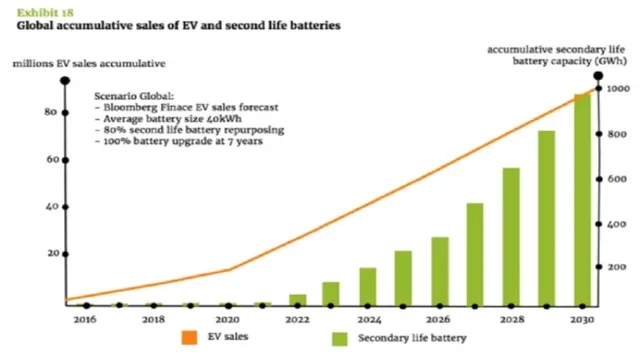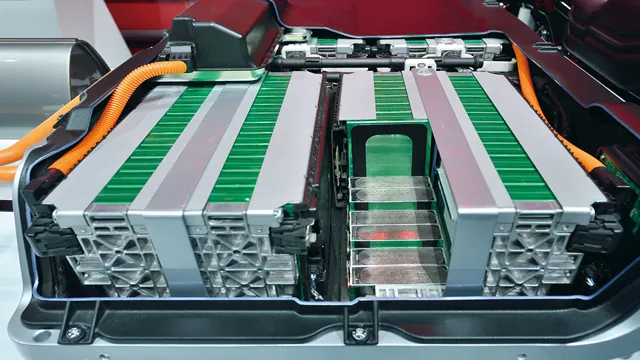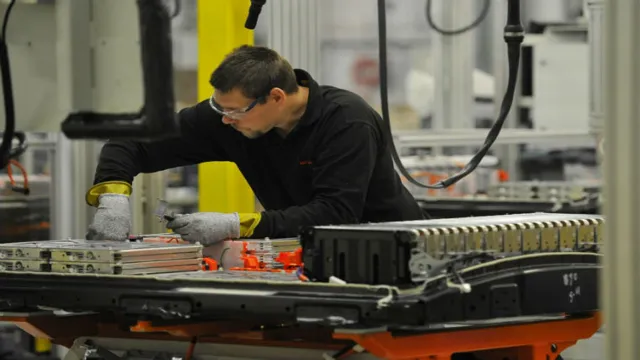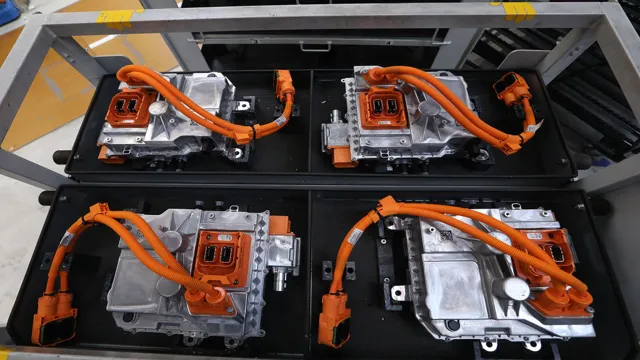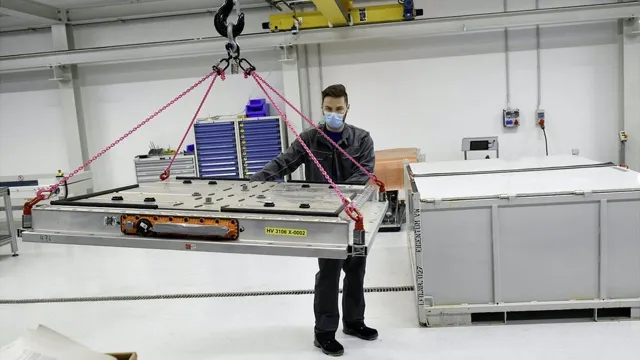The Shocking Truth: How Electric Car Batteries are Impacting our Environment
Electric car batteries have received a lot of attention in recent years due to the increasing popularity of electric cars. While electric cars are known to be more environmentally friendly than traditional gasoline-powered cars, the environmental impact of electric car batteries is clear. The production and disposal of these batteries have significant consequences for the environment.
As with any product, the manufacturing process for electric car batteries involves the use of a variety of resources, including water, energy, and materials. The mining of materials such as lithium, cobalt, and nickel, which are used to make these batteries, can also have a devastating impact on the environment. Additionally, the disposal of these batteries at the end of their life cycle can lead to toxic waste and pollution, which can have far-reaching consequences for the environment and human health.
Despite the potential environmental impact of electric car batteries, there are still ways to mitigate their impact. One solution is to increase the use of recycled materials in battery production and improve the recycling process of the batteries themselves. Of course, consumers can also help to reduce the environmental impact of electric car batteries by driving sensibly and maintaining their cars correctly.
Overall, as electric cars continue to grow in popularity, it is essential to consider the impact of their batteries on the environment and work towards finding sustainable solutions. While there are challenges involved, technology is rapidly advancing, and it is entirely possible to reduce the environmental impact of these batteries with the right approach and mindset.
Overview
The increasing adoption of electric cars is definitely a good thing for the environment as it reduces the combustion of fossil fuels. However, the production and disposal of electric car batteries also have their own environmental impacts. Production of these batteries require mining of various metals, such as lithium, cobalt, and nickel, which can lead to ecosystem destruction, pollution, and depletion of natural resources.
Moreover, the disposal of batteries that are at the end of their lives also raises environmental concerns due to the toxic chemicals they contain. Hence, it is essential to find sustainable solutions to minimize the environmental effects of electric car batteries, such as recycling and finding alternatives for the metals used in their production. Nevertheless, while electric cars might have their own set of ecological issues, they’re still one of the most sustainable options available today when it comes to personal transportation.
Explaining battery composition and production
Batteries are found everywhere, from our phones to our cars, and it’s important to understand how they work. A battery consists of two electrodes, the anode, and the cathode, separated by an electrolyte. The anode is negatively charged and the cathode is positively charged.
When a battery is connected to a device, electrons flow from the anode to the cathode, creating an electrical current. The production of batteries involves carefully mixing the necessary materials, such as lithium, cobalt, nickel, and manganese, in the right proportions and then forming them into the battery’s components. It’s important to note that different types of batteries are made up of different materials and have unique compositions.
For instance, Li-ion batteries have a lithium-coated anode, while lead-acid batteries have lead dioxide on the anode and lead on the cathode. Overall, understanding the composition and production process of batteries is essential as they become increasingly integrated into our daily lives.

How electric car batteries affect air pollution
Electric car batteries have the potential to significantly reduce air pollution caused by transportation. However, the production and disposal of these batteries can also have environmental impacts. The main component of electric car batteries is lithium, which is extracted through a process that can consume large amounts of water and energy.
Additionally, if not properly disposed of, these batteries can release toxic chemicals into the environment. Despite these concerns, the overall impact of electric car batteries on air pollution is still positive. By reducing the reliance on fossil fuels and promoting the use of renewable energy, electric cars can greatly reduce emissions and improve air quality.
It is important for manufacturers to continue to work towards more sustainable production and disposal methods for these batteries to maximize their positive impact on the environment.
Battery Disposal and Recycling
Electric car batteries have a significant impact on the environment, especially when they reach the end of their life. The improper disposal of these batteries can lead to pollution of waterways and soil, which can harm wildlife and human health. That’s why it’s crucial to recycle electric car batteries properly.
Recycling these batteries not only preserves valuable materials but also prevents hazardous waste from contaminating the environment. Electric car batteries consist mostly of lithium-ion, which can be recycled multiple times, making them a sustainable option. This process reduces the need for new mining and production, resulting in fewer carbon emissions.
Ultimately, recycling electric car batteries benefits both the environment and the economy, creating new job opportunities and supporting the transition to a cleaner, greener future.
Challenges in disposing of batteries
Battery disposal and recycling can be a challenging task. With the increasing use of portable electronic devices such as smartphones, laptops, and tablets, the demand for batteries is rising. Unfortunately, batteries pose a threat to the environment if not disposed of properly.
Many of these devices contain toxic chemicals, including lead, cadmium, and mercury, that can leach into the soil and water supply if not disposed of in an appropriate manner. This is why it is crucial to recycle batteries and ensure that their toxic components are not allowed to contaminate the environment. Recycling batteries has many benefits besides preserving the environment.
It can reclaim valuable materials such as cobalt, nickel, and lithium, that can be used to produce new batteries, reducing the need for mining and helping to conserve natural resources. So, the next time you need to dispose of your batteries, make sure to recycle them, as a small effort on your part can go a long way in reducing pollution and protecting our planet.
Types of battery recycling and their impact on the environment
When it comes to battery disposal and recycling, there are several methods available that can have varying impacts on the environment. One of the most common methods is smelting, where batteries are melted down and valuable metals like lead and cadmium are extracted. However, this process can also release harmful pollutants into the air and water.
Another option is hydrometallurgy, which involves using chemicals to dissolve the metals before they are extracted. This method can be more controlled and less polluting, but it requires careful management of the chemicals used. A third method is direct recycling, which involves breaking down the batteries into their constituent parts and then reassembling them into new batteries, but this can be more challenging and expensive.
Ultimately, it’s important to choose the right method for battery recycling based on the type of battery, the amount being recycled, and the specific environmental concerns in the area where the recycling will take place.
Recycling rates in different countries
When it comes to battery disposal and recycling, different countries have different practices and regulations. Some countries, such as Switzerland and Sweden, have high recycling rates, with up to 97% of their batteries being recycled. On the other hand, countries like the United States and Canada have much lower recycling rates, with only an estimated 5% of batteries being properly recycled.
This is a cause for concern, as batteries contain materials that can be harmful to the environment if not disposed of properly. When disposed of in landfills, batteries can release toxic chemicals that can seep into the soil and water. Therefore, it is important for individuals to properly dispose of their batteries and for countries to establish effective battery recycling programs.
By doing so, we can reduce the amount of waste we produce and protect our environment for future generations.
Future Outlook
As electric cars become more popular, the use of their batteries has raised concern over their impact on the environment. While these batteries are certainly better for the environment than traditional combustion engines, they still have negative effects. The production of these batteries requires a lot of resources and energy which contribute to carbon emissions.
Additionally, the disposal of these batteries can also be harmful to the environment. However, many companies are working on finding solutions to these issues. For example, battery recycling programs are becoming more common and sustainable sourcing of materials is being prioritized.
Ultimately, the impact of electric car batteries on the environment will depend on how we continue to develop and improve our use of them.
New battery technology and its environmental benefits
Looking towards the future, the advancements in battery technology bring with it immense environmental benefits. As the world shifts towards renewable sources of energy to combat climate change, battery technology plays a significant role in enabling energy storage. This shift towards a greener future is essential, and with new battery technology, it’s easier to achieve this.
The use of lithium-ion batteries has been widespread for energy storage, but the discovery of new materials offers immense potential for future development. These new batteries promise to offer higher energy density, longer life, and ultimately, are more environmentally friendly. The use of such batteries has the potential to reduce carbon emissions, minimize the use of fossil fuels, protect natural resources, and promote sustainable energy use.
As we move forward, it is imperative that we continue to invest in new battery technology that can provide us with environmentally friendly alternatives while supporting the world’s power needs.
Government policies on battery recycling and disposal
Looking forward, government policies on battery recycling and disposal are expected to become more stringent and comprehensive. As battery technology continues to advance, and electric vehicles and renewable energy systems become more prevalent, the issue of battery disposal and recycling will only become more pressing. Governments around the world are therefore seeking to establish standardized procedures for battery disposal and recycling.
Some countries, such as Japan and Germany, have already implemented strict regulations concerning battery disposal and recycling. Other countries, such as the UK and the US, are expected to follow suit in the coming years, as the importance of sustainable waste management becomes increasingly apparent. Ultimately, the successful implementation of government policies surrounding battery disposal and recycling will help to ensure the longevity of our planet and pave the way for a sustainable, clean-energy future.
Conclusion
In conclusion, the effects of electric car batteries on the environment are relatively positive. While there are concerns around the manufacturing and disposal of these batteries, the reduction in emissions from electric cars can contribute significantly to overall climate change mitigation efforts. With advancements in technology and a growing commitment to sustainable energy solutions, electric car batteries stand to become an increasingly important player in the fight against climate change, making them an electrifyingly smart choice for both the environment and our wallets.
“
FAQs
What are the environmental benefits of using electric car batteries?
Electric car batteries produce fewer emissions compared to traditional gasoline engines, reducing air pollution and greenhouse gas emissions. Additionally, electric cars have the potential to be powered by renewable energy sources, further reducing their environmental impact.
What is the lifespan of electric car batteries and their impact on the environment?
The lifespan of electric car batteries can vary, but most have an expected lifespan of around 10 years. However, when the batteries reach the end of their life, they can be recycled or repurposed for other uses, lessening their environmental impact.
What are the environmental concerns associated with the production of electric car batteries?
The production of electric car batteries involves the use of materials such as lithium, cobalt, and nickel, which can have negative environmental impacts if not responsibly sourced and recycled. However, efforts are being made to improve the sustainability of battery production.
How do electric car batteries compare to traditional gasoline engines in terms of overall environmental impact?
While electric car batteries do have environmental impacts associated with their production and disposal, they are generally considered to be more environmentally friendly than traditional gasoline engines. This is due to their lower emissions during use and the potential for renewable energy sources to power them.
